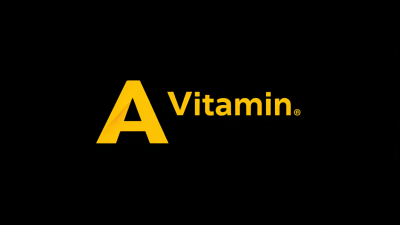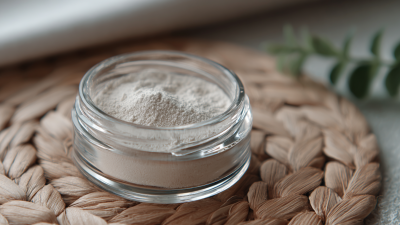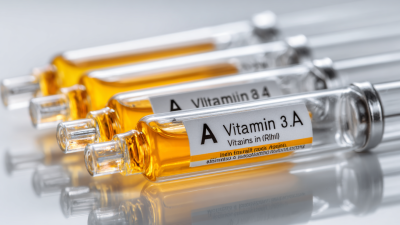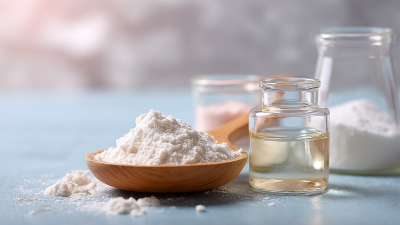The rising interest in nutraceuticals has ignited extensive research into advanced delivery systems that can enhance the bioavailability and efficacy of these beneficial compounds. A recent report by Grand View Research indicates that the global nutraceuticals market is expected to reach USD 505.4 billion by 2028, driven by the increasing demand for preventive healthcare solutions. In this context, Va Liposome technology has emerged as a promising alternative to conventional delivery systems.

Va Liposome is designed to encapsulate active ingredients, improving their stability and absorption in the body. As per a study published in the Journal of Nutraceutical Research, liposomal formulations can significantly increase the bioavailability of certain vitamins and minerals compared to traditional delivery methods. This blog will evaluate the unique advantages of Va Liposome over conventional systems, exploring its potential to revolutionize nutraceutical effectiveness and contribute to a healthier future.
The innovative Va liposome technology is redefining the landscape of nutraceutical delivery systems by optimizing absorption and bioavailability. By encapsulating bioactive compounds within liposomal structures, Va liposomes offer superior mechanisms to protect nutrients from degradation and enhance their transport across biological membranes. This is particularly significant in nutraceutical applications where the stability and efficacy of these compounds can be substantially compromised in conventional formulations.
One of the key mechanisms by which Va liposomes enhance delivery is through their phospholipid bilayer, which mimics cell membranes. This similarity facilitates more efficient fusion with target cells, allowing for a more direct release of active ingredients into the cellular environment. Additionally, the nanometric size of liposomes can improve circulation time in the body and minimize clearance, thus promoting sustained release and prolonged therapeutic effects. As research continues to unveil the nuances of Va liposome interactions with biological systems, their potential in boosting the effectiveness of nutraceuticals could represent a game-changer in health and wellness formulations.
The exploration of deliverability in nutraceuticals has been a vital focus for industry innovation. Recent studies indicate that VAs (Vesicle-Encapsulated Actives) liposomes provide a significant edge over conventional delivery systems. For instance, research published in the "Journal of Nutraceutical Science" revealed that encapsulation in liposomes can enhance bioavailability by up to 60%, compared to traditional delivery methods, which often yield lower absorption rates due to gastrointestinal degradation.
A comparative analysis of VA liposomes versus classical delivery techniques shows that liposomes not only protect sensitive compounds from oxidation but also facilitate targeted release. According to a report by Grand View Research, the global liposomal drugs market is expected to exceed $6 billion by 2025, demonstrating growing industry confidence in their efficacy. Moreover, the encapsulation efficiency of VA liposomes can reach up to 90%, which is significantly higher than conventional formulations that typically struggle to achieve above 50%. This advancement has the potential to revolutionize the way we approach nutraceutical formulations, ensuring that consumers receive maximum benefits from their supplements.
The bioavailability of nutraceuticals remains a critical factor affecting their efficacy, often hampered by conventional delivery systems that fail to optimize absorption in the body. Recent studies indicate that only about 5-10% of certain hydrophilic nutraceuticals reach systemic circulation when delivered via traditional methods. This inefficiency raises substantial concerns regarding the actual benefits these products offer to consumers.
Va liposomes present a revolutionary alternative by encapsulating nutraceutical compounds, enhancing their solubility and stability. Research demonstrates that encapsulated compounds can experience bioavailability improvements of up to 200-300% compared to free forms. For instance, a clinical report published in the Journal of Nutritional Science revealed that liposome-encapsulated curcumin achieved a bioavailability level eight times higher than its non-encapsulated counterpart. This significant enhancement underscores the potential of Va liposomes to not only improve absorption rates but also to bolster the therapeutic benefits of various nutraceuticals, thereby maximizing their health impacts.
With the nutraceutical market projected to reach USD 403.6 billion by 2025, the demand for efficient delivery systems is more pressing than ever. Companies investing in Va liposome technologies are likely to achieve a competitive edge by offering products with proven superior bioavailability, ultimately leading to greater consumer satisfaction and health outcomes.

The safety and efficacy of Va Liposome have gained significant attention in the nutraceutical industry, especially as more consumers seek reliable and effective health solutions. Clinical findings indicate that Va Liposome enhances the bioavailability of nutraceutical compounds, allowing for lower dosages while achieving optimal therapeutic effects. This innovative delivery system encapsulates active ingredients, protecting them from degradation and ensuring a controlled release in the body. Such attributes not only improve absorption but also minimize gastrointestinal discomfort often associated with conventional delivery systems.
Moreover, industry standards are evolving, reflecting the increasing demand for evidence-based solutions. Regulatory bodies are now incorporating liposomal delivery systems into safety evaluation protocols, emphasizing their importance in clinical applications. Studies have shown that Va Liposome exhibits a favorable safety profile, with minimal adverse effects reported. As researchers continue to explore its potential, the alignment of clinical data with industry benchmarks will be crucial in promoting Va Liposome as a preferred choice for consumers and healthcare providers alike. The insights gathered from ongoing clinical trials are set to further establish the viability of this advanced delivery system in the nutraceutical landscape.
| Metrics | Va Liposome | Conventional Delivery Systems |
|---|---|---|
| Bioavailability | Up to 80% | 30% - 50% |
| Stability | Enhanced | Moderate |
| Onset of Action | 15-30 minutes | 30-60 minutes |
| Safety Profile | High | Variable |
| Cost Efficiency | Moderate | Low |
| Patient Compliance | High | Moderate |
The future of nutraceutical delivery is increasingly leaning towards embracing liposomal technology, with significant implications for product efficacy and consumer health. According to industry reports, the global liposomal delivery market is projected to reach USD 6.2 billion by 2027, growing at a CAGR of 9.5% from 2020. This underscores the growing recognition of liposomes as superior vehicles for delivering bioactive compounds efficiently, ensuring higher absorption rates and enhanced stability compared to conventional systems.

Liposomal formulations not only improve the bioavailability of essential vitamins and minerals but also protect sensitive compounds from degradation. Research indicates that liposomal encapsulation can increase the bioavailability of certain nutraceuticals by up to 93%, compared to traditional delivery methods. As consumers become more health-conscious and demand more effective solutions, companies that integrate liposomal technology into their products are likely to gain a competitive edge. The trend towards personalized nutrition is also supported by liposomal technology, allowing for targeted delivery tailored to individual health needs, marking a significant shift in the nutraceutical industry.






